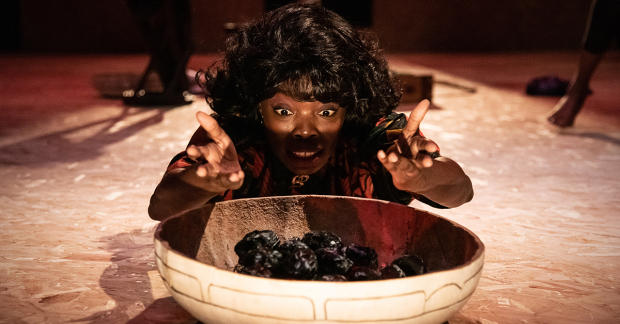Review: Here's What She Said to Me (Sheffield Crucible)

© Chris Saunders
There's something heartbreaking but also encouraging about this week's run of theatre shows that have struggled back in front of live audiences – only to be snuffed back out again by a new lockdown. The sheer variety of work on offer – from Sarah Kane's bleak Crave to Roy Williams and Clint Dyer's state-of-the nation Death of England: Delroy due to open at the National tonight – is uplifting.
Here's What She Said to Me, a production from Utopia Theatre, which had its world premiere at the Sheffield Crucible on Tuesday, and which was also live-streamed, is another interesting choice. It's a fairly straight narrative, told in a mix of styles, bringing dance, music, singing and a spot of poetry into its tale of four generations of Yoruba women who, whether in Nigeria or the UK, have their hopes of education and a career crushed by the conflicting pressures of family.
As written by Oladipo Agboluaje, the women are an impressive, determined lot but they are constantly held back by a patriarchal society and a lot of men of varying degrees of fecklessness and honesty. The pattern repeats down the years, though it's never entirely clear whether this is cultural or by choice; the play's tentatively optimistic conclusion is that if you give women agency to make choices, then you can't always expect them to pick career over children. I couldn't help wondering if the play it had been written by a woman whether the emphasis would have been different.
Nevertheless, Agboluaje tells a good tale, full of vivid characterisations, with the broad strokes of fairy stories – the wise grandmother, the wicked step-mother – mingled with more detailed and effective characterisation. The three characters we get to know best are the thwarted Agbeke (Ayo-Dele Edwards), who gets to university but falls in love with a man who relegates her status to that of a lowly third wife, her daughter Omotola (Estella Daniels) who overcomes rape and abuse to be able to afford to send her own daughter Aramide (Kiké Brimah) to a posh private school in England.
But en route there are many other encounters, all beautifully brought to life by these three versatile, immensely watchable actresses, putting on a hat to conjure a tyrannical father, or nursing a piece of fabric that floats away like a stream to conjure the pain of repeated miscarriage. They are all terrific, as is Mojisola Elufowoju's fluent direction that blends poetic effects, song and movement to potent effect.
The play perhaps tries to cram a little too much in, but the production is spare in its effects and absolutely clear in its shape and intent. Full of blessings and incantations, it casts its own spell by presenting dilemmas that are – to English eyes – revealingly different yet tangibly familiar. It only plays live for one more night, but will be available digitally from December.










